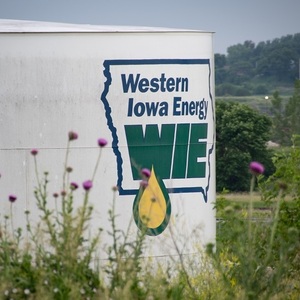Biofuel production still powers Iowa economy despite tough times

Photo: Jenna Higgins Rose, Iowa Biodiesel Board
March 12, 2020
BY The Iowa Renewable Fuels Association
A new study finds despite challenges, Iowa biofuel production continues to have a significant impact on Iowa’s economy, supporting more than 48,000 jobs and more than $2.4 billion in household income.
The study, authored by John Urbanchuk of ABF Economics and commissioned by the Iowa Renewable Fuels Association, also found that biofuels continue to account for more than $5 billion of Iowa’s GDP, or about 3 percent.
The study looked at the many challenges the industry faced in 2019, including the lapsed biodiesel tax credit and the demand destruction caused by excessive Renewable Fuel Standard refinery exemptions. The study found Iowa biofuels production could have supported more than 4,000 more jobs and $200 million more in household income in 2019 had the exemptions not been granted.
“This study confirms two very important truths—that biofuels continue to play a crucial role in Iowa’s economy, and that role was significantly hampered by RFS exemptions,” said Monte Shaw, IRFA executive director. “We are encouraged to see that despite the hard times and policy uncertainty Iowa producers faced in 2019, the economic benefits are still strong. It is, however, disheartening to know how much greater the benefits could have been to Iowa had EPA not granted over a billion gallons worth of demand-destroying RFS exemptions.”
Advertisement
Advertisement
Looking forward, the study concludes that growth of the biofuels sector “through new technologies and feedstocks” will only serve to enhance the economic impact of the industry, but “policy stability is essential to maximize these benefits. Uncertainty surrounding issues like RFS refinery exemptions, tax credit extensions, and trade with China, will impede the ability of the industry to provide these societal benefits.”
To view the full study, click here.
Advertisement
Advertisement
Related Stories
The U.S EPA on July 17 released data showing more than 1.9 billion RINs were generated under the RFS during June, down 11% when compared to the same month of last year. Total RIN generation for the first half of 2025 reached 11.17 billion.
The U.S. EPA on July 17 published updated small refinery exemption (SRE) data, reporting that six new SRE petitions have been filed under the RFS during the past month. A total of 195 SRE petitions are now pending.
The USDA has announced it will delay opening the first quarterly grant application window for FY 2026 REAP funding. The agency cited both an application backlog and the need to disincentivize solar projects as reasons for the delay.
CoBank’s latest quarterly research report, released July 10, highlights current uncertainty around the implementation of three biofuel policies, RFS RVOs, small refinery exemptions (SREs) and the 45Z clean fuels production tax credit.
The U.S. EPA on July 8 hosted virtual public hearing to gather input on the agency’s recently released proposed rule to set 2026 and 2027 RFS RVOs. Members of the biofuel industry were among those to offer testimony during the event.
Upcoming Events










